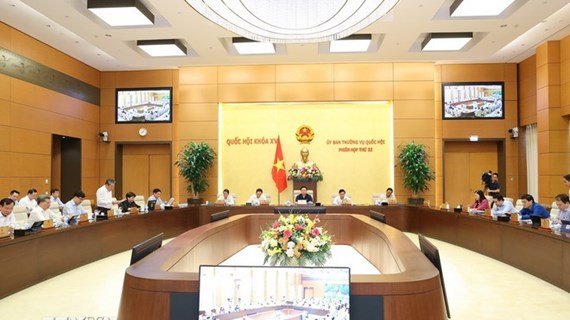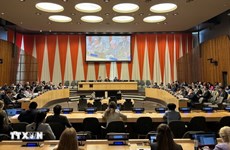Congress looks at child heart issues
Expectant mothers and families carrying foetuses with suspected or
diagnosed congenital heart disease should receive proper counseling
because they are often depressed, scared and anxious, a Malaysian expert
has said.
Expectant mothers and families carrying foetuses with suspected or
diagnosed congenital heart disease should receive proper counseling
because they are often depressed, scared and anxious, a Malaysian expert
has said.
At the three-day international congress of congenital and structural heart disease, which started on January 8 in Ho Chi Minh City, Haifa Abdul Latiff of the National Heart Institute of Malaysia (Institut Jantung Negara) said that counseling should involve an explanation of the foetal echocardiogram examination alongside adequate and appropriate information regarding the cardiac diagnosis.
This should include information about in utero progression, management options, assessment of the short- and long-term outcomes of the session and genetic counseling, Latiff said.
In foetuses with multiple congenital anomalies or mothers with medical problems, counseling should also include consultations with an obstetrician, a neonatologist, a geneticist, and physicians, the expert suggested.
The family should be allowed enough time to ask questions, to accept and to hold a family discussion especially when difficult decisions have to be made, he added.
The congress has also highlighted advanced technologies in the intervention of congenital and structural heart disease including coronary artery fistulae. They are usually detected by chance, according to MO Galal of King Fahad Medical City in Saudi Arabia.
In 75 percent of cases, coronary artery fistulae are solitary but they can also occur in association with congenital heart disease. Small fistulae are rarely symptomatic and require no treatment.
Presentations and symptoms of patients with the disease include congestive heart failure, arrhythmias, angina, myocardial infection, dilation of the fistulae, bursting of fistula, thrombi and endocarditis.
Currently, there is not an exact statistic on fistulae in Vietnam.
According to Associate Professor Dr Vu Minh Phuc, chairman of the society, Pediatrics Hospital No.1 admitted 17 cases of babies with fistulae in the period from 2010 to 2013.
Since 2010, the hospital has been using interventional catheterisation for the treatment, without surgery.
Dr. Do Nguyen Tin, head of the hospital's Interventional Cardiology Ward, said that the fistulae were very difficult to treat because the disease among children often occurs at unreachable positions in their body.
Tin hoped that he and his colleagues would be able to update and advance techniques for the fistulae via the congress.
Lucy Eun of Yonsei University Severance Cardiovascular Hospital in Seoul, the Republic of Korea, said that most coronary artery fistulae were congenital, resulting from the persistence of embryonic channels between cardiac chambers and the developing coronary circulation.
Careful diagnosis is required for good management of coronary artery fistulae, Eun said.
Coronary fistulas are often diagnosed by coronary angiogram, however, with the advent of new technologies such as Coronary Computed Tomography Angiography, the course and communication of these fistulae can be delineated non-invasively and with greater accuracy, Eun added.
The congress, which was called Fistulae from A to Z, held by HCM City Peadiatrics Cardiology and Congenital Heart Disease Society, attracted more than 300 international renowned experts and specialists in Vietnam and other countries including the US, the UK, Germany, Denmark, Saudi Arabia, Turkey and Japan.-VNA
At the three-day international congress of congenital and structural heart disease, which started on January 8 in Ho Chi Minh City, Haifa Abdul Latiff of the National Heart Institute of Malaysia (Institut Jantung Negara) said that counseling should involve an explanation of the foetal echocardiogram examination alongside adequate and appropriate information regarding the cardiac diagnosis.
This should include information about in utero progression, management options, assessment of the short- and long-term outcomes of the session and genetic counseling, Latiff said.
In foetuses with multiple congenital anomalies or mothers with medical problems, counseling should also include consultations with an obstetrician, a neonatologist, a geneticist, and physicians, the expert suggested.
The family should be allowed enough time to ask questions, to accept and to hold a family discussion especially when difficult decisions have to be made, he added.
The congress has also highlighted advanced technologies in the intervention of congenital and structural heart disease including coronary artery fistulae. They are usually detected by chance, according to MO Galal of King Fahad Medical City in Saudi Arabia.
In 75 percent of cases, coronary artery fistulae are solitary but they can also occur in association with congenital heart disease. Small fistulae are rarely symptomatic and require no treatment.
Presentations and symptoms of patients with the disease include congestive heart failure, arrhythmias, angina, myocardial infection, dilation of the fistulae, bursting of fistula, thrombi and endocarditis.
Currently, there is not an exact statistic on fistulae in Vietnam.
According to Associate Professor Dr Vu Minh Phuc, chairman of the society, Pediatrics Hospital No.1 admitted 17 cases of babies with fistulae in the period from 2010 to 2013.
Since 2010, the hospital has been using interventional catheterisation for the treatment, without surgery.
Dr. Do Nguyen Tin, head of the hospital's Interventional Cardiology Ward, said that the fistulae were very difficult to treat because the disease among children often occurs at unreachable positions in their body.
Tin hoped that he and his colleagues would be able to update and advance techniques for the fistulae via the congress.
Lucy Eun of Yonsei University Severance Cardiovascular Hospital in Seoul, the Republic of Korea, said that most coronary artery fistulae were congenital, resulting from the persistence of embryonic channels between cardiac chambers and the developing coronary circulation.
Careful diagnosis is required for good management of coronary artery fistulae, Eun said.
Coronary fistulas are often diagnosed by coronary angiogram, however, with the advent of new technologies such as Coronary Computed Tomography Angiography, the course and communication of these fistulae can be delineated non-invasively and with greater accuracy, Eun added.
The congress, which was called Fistulae from A to Z, held by HCM City Peadiatrics Cardiology and Congenital Heart Disease Society, attracted more than 300 international renowned experts and specialists in Vietnam and other countries including the US, the UK, Germany, Denmark, Saudi Arabia, Turkey and Japan.-VNA













